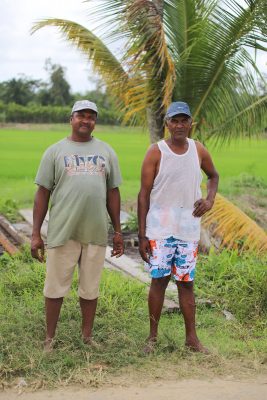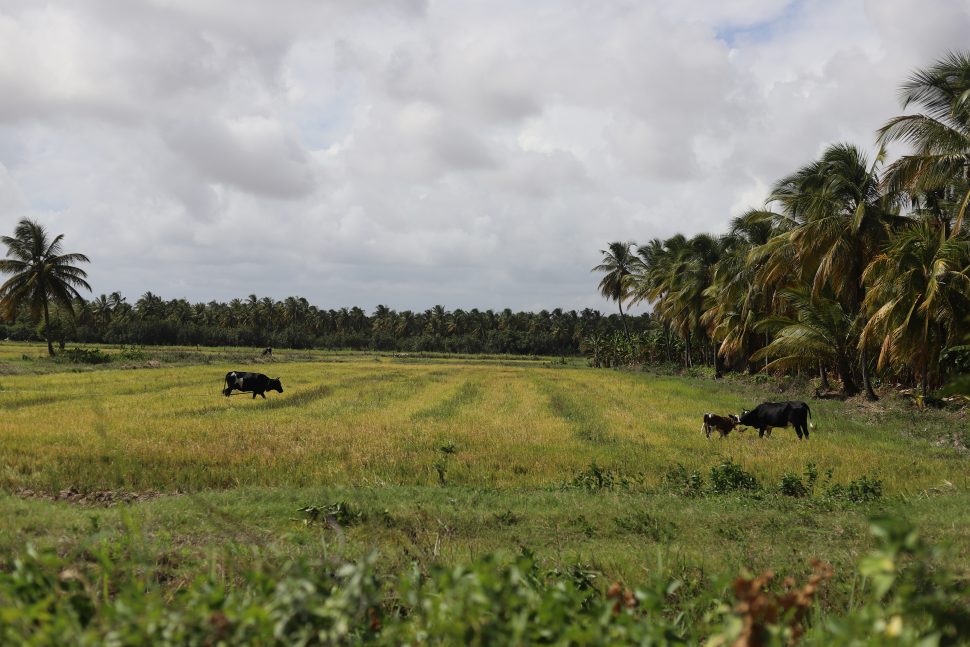Fed up with late payments for their paddy and mounting production costs, many of Wakenaam’s rice farmers have shifted to cultivating plantain and coconut.
During a visit to the island two weeks ago, Wakenaam Neighbour-hood Democratic Council (NDC) Chairman Sheik Ahmad said that as a result of the challenges facing the farmers, only about 35% of the available land is being used for rice.
Instead of rice crops, a lot of the land is now covered by weeds and shrubs and most of the farmers have resorted to using their lands for cattle grazing.
According to veteran rice farmer Dharmendra Nandcoo, who has been planting rice for more than five decades, one of the main issues the farmers currently face is late payment by the main miller who purchases most of their rice.

“If you sell your paddy, you not gonna get your money right away. The man does take three to four months to pay you and you can’t turn over anything. This happening about four crops now. The last crop he tek about three months to pay we,” Nandcoo said.
He explained that while they were able to harvest during the September to October period last year and supplied the miller with paddy, they are still to be fully paid. He added that payment for the crop before, which they harvested during the March to April period, was not fully received until July.
Another farmer, Rash (only name given), explained that the same miller owes him $1.5 million. “…And me is a small farmer. It got some man he owe $8 million to $9 million since last crop and when you ah call GRDB [Guyana Rice Development Board], they nah know nothing. They said the government nah got no arrangement with farmer and miller, so it look to me like the miller want to rob farmer and that’s what he doing,” he explained.
Nandcoo, who is currently planting only 12 acres of rice, a steep drop from what he used to before, explained that he was only paid $500 per bag of paddy but is yet to be paid his outstanding balance by the same miller.
“Today I try fuh call he and I ain’t get through and is the same thing every time. I sell he about 400 bags of paddy and abee get a lil advance payment like $500 a bag and this man got abee since October and not a dollar since,” Nandcoo said, while stating that the miller has an outstanding balance of more than $600,000 for him.
Another farmer, Ivan, who is currently planting 140 acres of rice, said he has only received payment for half of his crop.
The farmers explained that while rice was planted on over 3,000 acres in the past, over the last four years that figure has decreased by more than 50%.
“Now must be barely got about 1,000 acres or more. It reduced by more than half and another one of the reason is because of marketing. It’s very costly for us to farm rice here, ’cause when we finished harvesting we have to take it to the Essequibo Coast to the miller at a cost of $300 per bag. We have to take it to him and that man like he does just want penalise abee,” Ivan noted.
In addition to the issues with the miller, the farmers pointed out that the deplorable condition of the main road to the access dams also affects their production because of the mounting expenses they have been incurring.
As a result, farmers have moved to the plantain and coconut markets.
“That’s [plantain and coconut] what people ah survive on right now. The whole island planting plantain and everybody with a rice field using the bed heads for plantain and that’s what bracing them to survive because the rice not getting you money,” Ivan added.
Meanwhile, Ahmad agreed that the cost to transport the paddy to the Essequibo Coast is severely hindering the farmers.
“There’s no subsidy for that, so when the paddy price is at $2,300 then you have to deduct that $300 and now you have to deduct a further $2,000 for fertiliser, rent if you’re renting the land, fuel, ploughing and other costs of production. That’s why Wakenaam barely has about 35% of rice planting in the last two years. The other 65% is about 3,000 more acres that can be added,” he said.
To address the situation, Ahmad said there is a need for a government-supported mill or a corporate mill for the farmers to use, instead of having to rely on a single miller.
“It has been a problem and the past and prevent government seem not to have an effective handle with the same miller. It’s not that he doesn’t pay but he takes very long to pay,” he said.
Ahmad added that with plantains and coconuts, in most cases the farmers can sell right from their farms. He said, too, that there is a current demand for the crops.
“They start a portion of the rice field and plant an acre and if you compare the cost of production you’re making way more. Coconut is doing well also and those are basically what is keeping Wakenaam alive today. The rice just helps to cushion along the line for people who have debt. And the main people who are planting rice still are the ones with their own equipment and land,” Ahmad added.
The farmers also noted that persons have begun migrating in droves and pointed out a number of abandoned houses that have been left idle on the island.
“Everybody on the island got somebody outside and whoever left right now most of them got one foot in here and another foot somewhere else,” a farmer said, while stating that he envisions a grim future for Wakenaam if the current issues continue.










